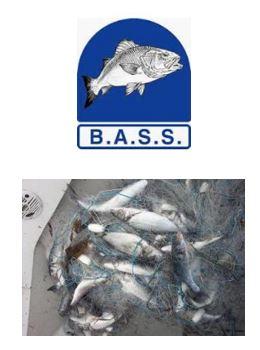Angling Trust and B.A.S.S ‘broadly welcome’ new EU bass conservation plans
Angling organisations, who have been battling for a better deal for threatened bass stocks and for the introduction of sustainable forms of bass fishing, have today welcomed the announcement by the European Commission that should see the removal of damaging gillnets from the bass fishery in the North Sea, English Channel and North Atlantic.
If the proposals are adopted by the Council of Ministers at the forthcoming Fishing Opportunities meeting in December, commercial bass exploitation will be restricted to hook and line fishing only for ten months of the year in 2017, with a closure in February and March to protect spawning aggregations.
Recreational anglers will be allowed to retain ten fish a month during the ten month open season, as opposed to one fish a day for just six months as is currently the case.
Overall the Commission’s proposals to remove the nets from the bass fishery will make a significant reduction in commercial bass mortality, while the recreational take is likely to remain broadly similar. However, the introduction of the more flexible monthly bag limits for anglers – something the Angling Trust has been arguing for – will help to undo some of the damage done to the charter boat fleet which lost up to 20% of its revenue as a result of a downturn in anglers’ bookings following the introduction of the zero and one fish bag limits for 2016.
Both the Angling Trust and the Bass Anglers’ Sportfishing Society (B.A.S.S.) have been examining the evidence of the impacts of the 2016 measures on both bass stocks and on recreational bass fishing in order to formulate a series of proposals to the European Commission and to UK Fisheries Minister George Eustice. This included three separate surveys carried out among charter boat skippers, bass guides and sea anglers to determine the true socio-economic impacts of 2016 measures for recreational bass angling. The conclusions point to a significant loss of revenue for small businesses and coastal communities. Angling charter boat skippers in England have seen revenues slashed by more than one-fifth and coastal towns are losing up to £3 million in valuable tourism revenue as anglers stay away.
The survey carried out by the Professional Boatman’s Association (PBA) showed that an estimated £2.87 million is projected to be lost by charter boat businesses, which take anglers to sea to fish recreationally for bass and other species. The losses amount to more than 50 per cent of the total value of commercial bass landings in the UK, with individual charter skippers reporting an average of 22 fewer bookings and losing more than £8,000 in revenues.
The Commission proposals published today state: “On the basis of social and economic impacts limited fisheries using hooks and lines should be permitted, while providing for a closure to protect spawning aggregations.
“Additionally, due to incidental and unavoidable by-catches of sea bass by vessels using demersal trawls and seines, such by-catches should be limited to 1% of the weight of the total catch of marine organisms on board.
“Catches of recreational fishermen should be restricted by a monthly limit.”
Despite evidence to the contrary, the commercial sector lobbied strongly for the retention of damaging gillnetting – a practice which impacts on more than just fish with cetaceans, seals, sea-birds regularly caught up in inshore nets with lethal results. They also argued unsuccessfully for their allowable bass by-catch to be raised from 1% to 5%, which would have allowed netting to continue via the back door.
Nigel Horsman, from B.A.S.S. said: “These proposals are very good news for bass stocks, which have been declining dramatically over recent years, to a dangerously low level. Halting that decline and giving the stocks a chance to recover is not only good news for anglers, and all the businesses and livelihoods that depend on angling, but is a welcome development for truly sustainable (hook and line) commercial fishermen.
“It is important now that the long term benefits that will arise from these management measures are not lost in the horse trading of the December Fishing Opportunities meeting. These measures can form the basis of a long term management plan for bass and would allow, for instance, a maximum landing size for bass to be introduced, in order to protect the largest, highly fecund females which are key to a healthy stock.”
Angling Trust National Campaigns Coordinator Martin Salter, who has long argued for bass to become a ‘net free species’, added: “At long last the Commission appears to have listened to the scientific advice and is learning the lessons from other countries like the USA where valuable bass stocks are managed much more sustainably.”
David Mitchell, Head of Marine at the Angling Trust, said: “It’s good to see the European Commission, so often seen as the enemy, put forward some progressive, balanced and sensible measures to protect bass stocks. Unlike last year it’s essential that these measures are implemented by the Council of Ministers when they meet in December.
“The proposal for a monthly bag limit for recreational catches is one we believe offers a fairer deal for anglers who were given a terrible deal last year once the Commission’s proposals had been watered down by the politicians.”






